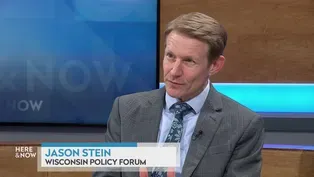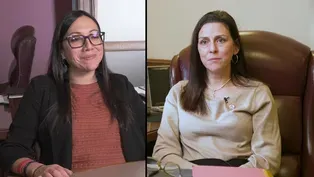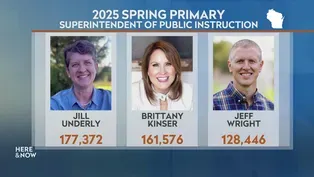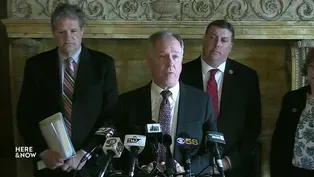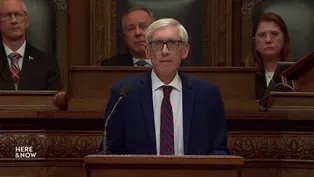Here and Now
The 2025 Candidates for Wisconsin Supreme Court and Recusal
Clip: Season 2300 Episode 2332 | 7m 47sVideo has Closed Captions
When would Susan Crawford and Brad Schimel recuse from a Wisconsin Supreme Court case?
Wisconsin Supreme Court candidates Susan Crawford and Brad Schimel are receiving campaign support from political parties and have partisan backgrounds — when would they recuse themselves from a case?
Problems with Closed Captions? Closed Captioning Feedback
Problems with Closed Captions? Closed Captioning Feedback
Here and Now is a local public television program presented by PBS Wisconsin
Here and Now
The 2025 Candidates for Wisconsin Supreme Court and Recusal
Clip: Season 2300 Episode 2332 | 7m 47sVideo has Closed Captions
Wisconsin Supreme Court candidates Susan Crawford and Brad Schimel are receiving campaign support from political parties and have partisan backgrounds — when would they recuse themselves from a case?
Problems with Closed Captions? Closed Captioning Feedback
How to Watch Here and Now
Here and Now is available to stream on pbs.org and the free PBS App, available on iPhone, Apple TV, Android TV, Android smartphones, Amazon Fire TV, Amazon Fire Tablet, Roku, Samsung Smart TV, and Vizio.
Providing Support for PBS.org
Learn Moreabout PBS online sponsorshipfor joining us and your expertise.
>> Thank you.
>> This year's election for a seat on the Wisconsin Supreme Court is shaping up to be one of the most expensive ever.
Fundraising totals released by the campaigns of Liberal candidate Susan Crawford and Conservative candidate Brad Schimel show they are on pace to exceed the $50 million price tag from 2023, which was the most expensive state Supreme Court race in American history.
Here and now, senior political reporter Zach Schultz has more on how all this money will impact the cases.
The winner will hear once they are on the court.
>> Arthouse Preschool.
And with Susan Crawford on the bench, your street could be next.
[MUSIC] >> Brad Schimel is too extreme for the Supreme Court.
>> Just five weeks from Election Day, the Schimel and Crawford campaigns are filling the airwaves and social media with millions of dollars in campaign ads.
In 2023, the race between Janet Protasiewicz and Daniel Kelly was the most expensive state Supreme Court race in U.S. History, with candidates and third party groups spending more than $50 million.
It was for an open seat, and the winner would determine the ideological control of the court.
It's the same setup in 2025, so it should come as no surprise.
We're on pace to break spending records.
>> It's like inflation.
It never goes down.
It always only seems to go up and I suspect this race is going to have even more money spent than in 2023.
You know, you can only run so many TV ads before you've made your point.
But this is what you've got to do.
I've got to be competitive.
The other side has got to be competitive.
We're both working to have the resources we need to get our message out.
>> The maximum an individual can donate to a campaign is $20,000.
But years ago, Republicans rewrote campaign laws so individuals could give an unlimited amount to state parties, which can in turn give unlimited amounts to campaigns.
In the latest fundraising totals, billionaire donors gave millions to the Republican and Democratic parties.
The Republican Party of Wisconsin transferred $1.7 million to Schimel campaign, while the Democratic Party of Wisconsin transferred 3 million to Crawford's campaign.
In 2023, Janet Protasiewicz received a lot of direct transfers from the Democratic Party of Wisconsin to help fund her campaign, and in turn, she said that she would recuse herself from any cases that involved the Democratic Party of Wisconsin as a party.
Would you do the same if you receive a large, direct contributions from the Democratic Party of Wisconsin?
>> You know, I what I would do is if a case came before the Supreme Court in which the Democratic Party was a party is to look at what the facts were in that case, who the other parties were and what the legal issues were that at stake, and then make a decision about recusal based on the specific instances of that case.
I think, you know, I'm a I'm a pretty cautious person as a judge.
And I, I don't prejudge matters like that and would wait to see what what that case brought and whether I could be fair and impartial.
And if, if it was a situation where I believed I could not be fair and impartial due to past political support, financing support from the Democratic Party, I would certainly recuse.
>> How will you approach recusal when it comes to those who have supported you, donated to you, endorsed you?
>> Well, it's awfully hard for justice.
Protasiewicz to say.
She'll recuse on anything that the Democratic Party is involved in.
But then she stayed on the legislative redistricting maps, and she came.
Well, they're not directly a party.
Come on.
They were the clear beneficiary of that decision.
I think she was putting form over substance very much there.
But for a judicial official at any level, your responsibility is if you have a personal stake, you or some family member has a personal stake in the outcome of this case, you must recuse.
That's unethical not to do so.
Otherwise, just like a juror, when they're asked questions in the jury box, can you to find out whether they can be on this case and be fair and impartial?
The judge needs to search their soul and determine, can you decide this case without having any political baggage, without having your personal history or biases interfere with your ability to be fair and impartial?
If you cannot do that, then you should recuse.
Legislature.
>> One of the biggest cases the winner could see is a challenge to act ten.
The Scott Walker era law that eliminated most collective bargaining rights for most public employees.
Just recently, Justice Protasiewicz announced she would not recuse herself from the act ten challenge, currently heading to the appellate courts, saying her opposition to the law as a private citizen would not impact her ability to rule as a justice.
>> However, Conservative Justice Brian Hagedorn announced he would recuse himself from hearing that case because while serving as then governor, Walker's chief legal counsel, Hagedorn helped write that law and later defended it in court.
Crawford served in that exact same position for Governor Jim Doyle, so she understands Hagedorn's role.
>> So for him, having taken a position already on that exact provision and trying to defend it in court, I think he made the right decision to recuse himself.
And, you know, if I had been in exactly that situation as Justice Hagedorn is, I think I would have made the same decision.
general from 2015 to 2019.
>> Act ten was resolved in the US Supreme Court and the Seventh Circuit Court of Appeals.
Even before I was attorney general, I was still in the DA's office when those issues were decided by those courts.
So I've never had any direct role in anything involving act ten.
What I do ask voters is to ask themselves whether they think that if my opponent wins, can this court truly be objective?
When two justices sitting on the court, both Justice Protasiewicz and Justice Dallet, were both caught on video promising if elected they would strike down act ten and then my opponent represented the Madison Teachers Association in the lawsuit to strike down act ten, and she argued that it should be found unconstitutional.
Can she be objective?
When she had a former client that that had her do that work for her?
And can those other two be objective based on those promises?
I can ask those questions.
I'm not going to tell anybody how I'm going to rule, because like I do in every case, I will read the briefs, I will assess the facts, I will look at the relevant law.
I'll read all the cases, and then I'll assess what the right answer is based on the law.
>> In private practice.
You also were a part of an act ten lawsuit.
Would that prevent you from sitting on any cases regarding act ten in the future?
>> You know, if a case came up, whether it's on act ten or anything else, that any other topic that I had some role in, in, in challenging while I was a lawyer, I would give it a very close look to see what the facts were that were presented in that new case, who the parties were, and what kind of legal issues are being raised, and make a determination about whether I could be fair and impartial.
Sitting on that case.
That's what the law requires us to do, and that's what I do in every
Here & Now opening for February 21, 2025
Video has Closed Captions
The introduction to the February 21, 2025 episode of Here & Now. (1m 1s)
Jason Stein on the Politics of Wisconsin's 2025 Budget Cycle
Video has Closed Captions
Jason Stein on the prospects of the 2025-27 state budget proposals from Gov. Tony Evers. (6m 21s)
New Lawmakers Find Their Bearings in Wisconsin's Legislature
Video has Closed Captions
A pair of new Wisconsin lawmakers share their thoughts at the start of the 2025 session. (6m 43s)
Underly and Kinser Advance to the Spring 2025 DPI Election
Video has Closed Captions
Dr. Jill Underly and Brittany Kinser won the spring 2025 primary for state superintendent. (37s)
Wisconsin Republicans Pass Educational Standards Package
Video has Closed Captions
Assembly Republicans passed education bills on testing, administrator pay and more. (1m 38s)
Wisconsin's 2025 Budget Proposals from Evers and Republicans
Video has Closed Captions
Tony Evers unveiled his 2025-27 state budget, and Mark Born shared the Republican stance. (2m 4s)
Providing Support for PBS.org
Learn Moreabout PBS online sponsorshipHere and Now is a local public television program presented by PBS Wisconsin

